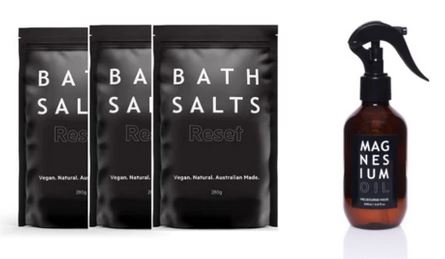When it comes to our children – growing, developing and paving new neurological pathways every single day – magnesium is a critical part of their overall wellbeing. Magnesium deficiency is one of the more common deficiencies seen in children and can lead to many physical and mental health concerns. (See this study here)
But the same can be said of adults as well. This is because magnesium is such an important mineral for human health. It is the second most abundant electrolyte within the cells and the fourth most abundant mineral in the human body. It is also a mineral our body does not create on its own so it has to come from external sources.
Without sufficient magnesium in our body over 300 biochemical reactions are affected including: energy and DNA production; muscle and hormone function; blood glucose control and activation of crucial vitamins like B1 and the ability to utilise other nutrients like calcium, potassium and zinc. Looking at this list, it’s fair to say magnesium is needed by the human body every single day.

How does magnesium helps us get a good night’s sleep
Magnesium has a reputation for being able to help us get a good night’s sleep. This is because it calms our nervous system. Without getting too boring with all the science, here’s why magnesium does this.
Magnesium and GABA (Gamma Amino Butyric Acid) work hand in hand. GABA is the body’s relaxing, sedative and calming brain chemical (neurotransmitter). GABA acts as a brake to the more stimulating (excitatory) neurotransmitters in the brain – a big one being glutamate. Glutamate is responsible for sending signals between nerve cells and when all is healthy it plays and important role in learning and memory.
However, Glutamate can excite cells far beyond a healthy level. (See this study here) GABA prevents the glutamate nerve impulses which are associated with anxiety and stress. (See this study here) Studies have shown magnesium binds to and activates GABA receptors which helps reduce anxiety and decreases the breakdown of GABA in the brain, leading to more stable GABA levels. (See this study here)

How many children are deficient in magnesium?
There is no hard data yet about how many children in Australia are deficient in magnesium but it’s been estimated at levels of around 42%. Because our bodies don’t create this mineral naturally, we rely on adequate amounts through our diet but unfortunately, the quality of the soil that our food is grown in has been jeopardised by farming practises and the use of fertilisers.
This means our soils are depleted in the essential minerals our bodies need to function optimally and magnesium is top of the list here. On top of this, the common foods our children like to indulge in are generally not the magnesium rich sources like leafy greens, nuts, seeds and legumes.
When our body is experiencing higher levels of stress – whether physical or emotional – it releases magnesium from our cells. This in turn increases our bodies need for the mineral to replenish it. So whether your stress comes from high levels of exercise (i.e. people who train a lot including athletes) or from high anxiety levels from your work load at school or work, you’re going to need to supplement this mineral in your diet.
What are the signs of magnesium deficiency?
A deficiency in magnesium can lead to:
- Increased agitation
- Anxiety, irritability or depression
- Short attention spans
- Problems sleeping
- Aggression
- Twitching muscles
- Teeth grinding
- Restlessness
- Constipation
- Cramps
- Growing Pains
- Low energy levels
Australian company, Salt Lab, has brought out a Magnesium Oil which is safe and easy for children to use.
An Australian company called Salt Lab is now producing a magnesium oil which is safe and easy for children to use – and good for athletes, pregnant and breastfeeding women and the elderly. Melbourne-based personal trainer, nutritionist and health coach, Clementine Beale, developed the oil after she faced some health issues herself and found magnesium oil was so beneficial.
Salt Lab products are vegan and made from 100% naturally-derived ingredients, offering a premium method for safely increasing magnesium levels in the body. All you need to do is spray the oil on your body and rub it in and you’ll feel the benefit. It’s particularly good to use before you go to bed as you’ll find you sleep longer and deeper.
As well, it’s useful for relieving sore muscles and joints, reducing pain related to functional magnesium deficiency and replenishing depleted soft tissues.
Why should children in particular use magnesium oil?
Beale says some of the most common questions she gets asked at Salt Lab about magnesium oil for kids are:
Q. Is magnesium oil safe for my children?
A. Yes, absolutely. If you are seeing signs that your child may have low levels of magnesium or you struggle to get your children to eat the food that are rich in this essential mineral like dark leafy greens, nuts and seeds and legumes then a supplement is probably a good idea.
Magnesium oil is a safe way for you to supplement for your children as you are allowing their body to self-regulate and absorb what is needed without the risk of overdosing or putting unnecessary pressure on their digestive system. Always test on a small area like your child’s feet, we recommend only adding a supplement form the age of 3 months and older.
Magnesium will assist in relaxing your baby’s nervous system and improve their quality of sleep. You can apply a small amount of Magnesium Oil to their feet or into their bath at night.
Q. How much magnesium does my child need?
A. All children are different and if you have highly active kids that sweat a lot they are going to need more magnesium than a more sedative child that doesn’t sweat much so keep this in mind when you review the below, we recommend using this table as a guide only.
| Age | Recommended magnesium intake |
| 1-3 years | 80 mg/day |
| 4-8 years | 130 mg/day |
| 9-13 years | 240 mg/day |
| Females | |
| 14-18 years | 360 mg/day |
| Males | |
| 14-18 years | 410 mg/day |
Q. If I don’t want to add a supplement what is the best way to include more magnesium rich foods in our child’s diet?
A. Adding the below foods into as many of their meals as possible throughout the day will significantly increase their daily intake. Keep in mind, our foods are not as rich in the minerals they use to be either so the amount needed to meet our daily requirements is significant.
- Spinach and leafy greens (we love a smoothie with added spinach)
- Nuts and seeds (added into banana bread, sprinkled on top of meals. Organic peanut/nut butters)
- Bananas
- Legumes (we add this into our soups and stews)
- Whole wheat (we make our own bread to ensure we are using organic whole wheat flour)
Beale adds it’s important to reduce the amount of sugar your child eats because sugar burns through our body’s magnesium stores.
The benefits of magnesium oil for children of all ages is significant, impacting their ability to turn up each day and be supported in the growth and development ahead of them. By introducing this mineral into your child’s life before they are needing to play catch up sets them up to be able to function properly and be in control each and every day. The benefits this mineral will offer are wide and varied, including: better sleep, improved concentration, increased energy levels, more balanced moods, healthy muscle and verve function, and improved absorption of other minerals.
Beale says Salt Lab’s Magnesium Oil Spray is: “A natural, effective and safe way to soothe skin, relax, unwind and drift off to sleep. The oil is readily absorbed through the skin for enhanced recovery and performance.”
















